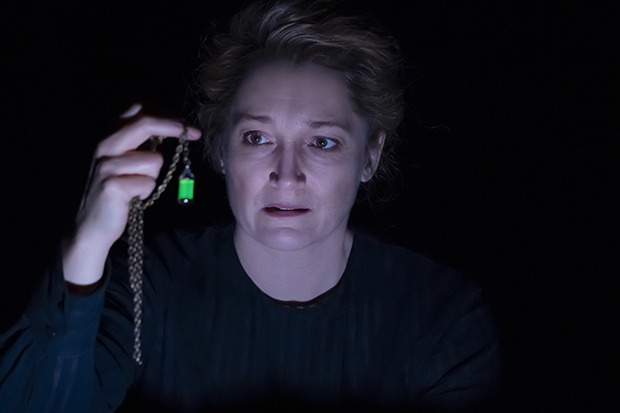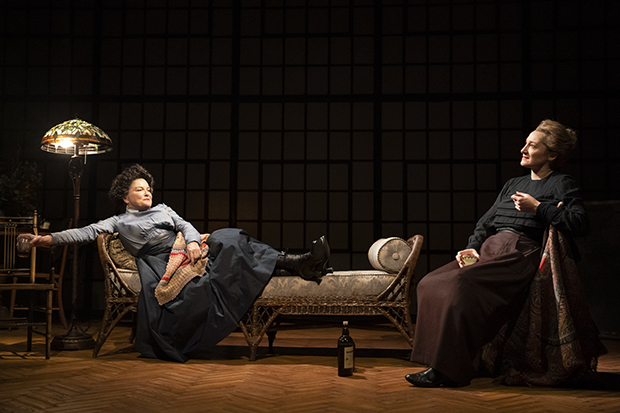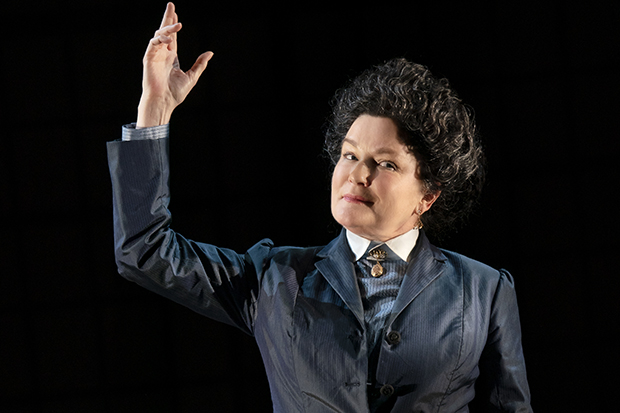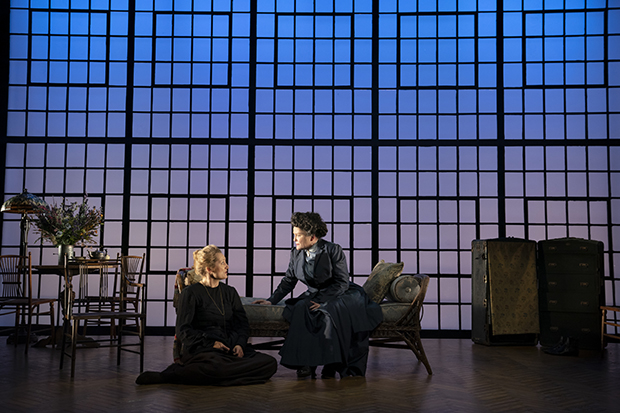The Half-Life of Marie Curie Shows How Marie Got Her Groove Back
Audible produces Lauren Gunderson’s two-person play about the friendship between Curie and Hertha Ayrton.

(© Joan Marcus)
The pendant glimmers, showcasing not a rare gemstone, but a vial of radium. Marie Curie (Francesca Faridany) wears it around her neck, and if you know anything about the celebrated physicist, it is that prolonged exposure to radiation eventually killed her. This striking accessory gives The Half-Life of Marie Curie (an Audible commission by Lauren Gunderson) an air of fate: Like Oedipus, she cannot escape her destiny. But in this entertaining two-hander, Gunderson makes a powerful case that Curie's death at the age of 66 is the least interesting thing about her legacy.
The play begins in 1911, just as news of Curie's affair with Paul Langevin has become the scandal of France. While Curie is widowed, Langevin is still married to an estranged wife, with whom he has four children. The French public has turned against Curie, with the xenophobic press characterizing her as a foreign Jewish temptress (although Curie was born in Poland, she was not Jewish). But her dear friend Hertha Ayrton (Kate Mulgrew) is Jewish, British, and fabulous. As Marie wallows in her misery, Hertha swoops to the rescue. An electrical engineer and suffragette, Hertha takes her sister scientist away to the Hampshire seaside where Marie can lick her wounds and plot her comeback.

(© Joan Marcus)
The play (the first major two-character play from Audible, which has previously favored solo shows) makes us privy to the friends' private dialogue as imagined by Gunderson: They talk about the trials of being women in a male-dominated profession, and the pain of love and loss. Sparks fly when Hertha tries to convince Marie to part with her radium, and tongues loosen when whiskey flows. It's fun to be a fly on the wall for these conversations between two brilliant women.
Gunderson traffics in some transparent contrivance to dramatize the two women's biographies. When Hertha grandly suggests that Marie could stick it to her detractors by winning another Nobel Prize, she coyly responds, "I actually…did." Talk of awards and grants peppers their conversation (one imagines how much fun Gunderson would have theatricalizing the program bios). By the end, Gunderson has the two characters directly address the audience for an epilogue that recounts heroic conduct in World War I before fast-forwarding to each woman's death. One can easily imagine these scenes coming off as insufferably stagey.

(© Joan Marcus)
Thankfully, they never do in Gaye Taylor Upchurch's snappy production — which literally has members of the audience snapping in agreement to some of the lines. This is particularly true for Herta, who gets all the best zingers. Mulgrew wins our hearts from her very first line, delivered as one breathless sentence: "There was a technical problem in the world and I fixed it and you're welcome." Mulgrew endows Hertha with a plummy accent and natural warmth so that she emerges as a true friend, ever-armed with a British stiff upper lip and a Jewish quip. She's a real Dame Judi Mensch.
Faridany's Marie is far more serious, intensity and desperation radiating off her in electromagnetic waves. She's clearly a genius, but that doesn't make her immune to depression. The reaction between her subdued energy and Mulgrew's plucky vigor makes for a great back-and-forth. Both actors possess attractive and expressive speaking voices, which are certain to make the forthcoming audio play a worthwhile listen.
Darron L. West's sound design further enriches the aural landscape: Not only can we hear the French rabble and English gulls, but West underscores sections of the play with the music of Frédéric Chopin (like Curie, a Polish transplant to France). Beautiful, melancholy nocturnes waft in from stage left, where we are told Marie's daughter Eve is practicing (Eve became a concert pianist and lived to 102).

(© Joan Marcus)
Upchurch doesn't skimp on the visual design just because she's working for Audible: Rachel Hauck's set uses a few simple items to create Edwardian splendor. Using a backdrop of industrial windows, she has smartly collaborated with lighting designer Amith Chandrashaker to make the same set represent both Marie's gloomy Sceaux home and Hertha's airy summer house. A Tiffany-style floor lamp provides decoration and genuine illumination in one of the play's most intimate scenes. Sarah Laux's costumes conjure the period and the emotional state of our characters: Throughout much of the play, Marie wraps herself in a bulky black cardigan, the ideal knitwear for convalescence.
But sweaters alone cannot heal what ails Marie. The Half-Life of Marie Curie shows that Curie made it through this delicate period in her life with a little help from her friend. And considering all that Curie accomplished in the remaining 23 years of her life (innovations that we still use today, like mobile X-rays), we should be glad that Ayrton was there to avert a potential meltdown.









